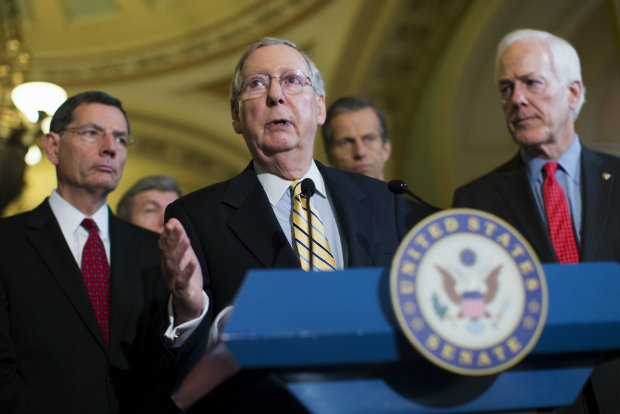
Senate Majority Leader Sen. Mitch McConnell, R-Ky., answers a question during a news conference on Capitol Hill in Washington, Tuesday, April 21, 2015. Republican and Democratic lawmakers talked about putting the final touches on a human trafficking bill, and turning their attention to Attorney General nominee Loretta Lynch. From left are, Sen. John Barrasso, R-Wyo., Sen. Roy Blunt, R-Mo., McConnell, Sen. John Thune, R-S.D., and Senate Majority Whip John Cornyn of Texas. AP
WASHINGTON — Bipartisan legislation aimed at helping the victims of sex trafficking is set to pass the U.S. Senate after lawmakers ended a partisan dispute over abortion that has sidetracked the bill for weeks.
The legislation, which looks likely to pass by a wide margin Wednesday afternoon, would boost law enforcement resources and create a new fund to help victims. Its approval would clear the way for a vote on President Barack Obama’s pick for attorney general, federal prosecutor Loretta Lynch, whose nomination was put off by Republican leaders until the trafficking bill could be resolved.
The Lynch vote could come on Thursday. She would replace Eric Holder and become the first black woman to hold the nation’s top law enforcement job. Democrats have railed against the monthslong hold-up on her confirmation, with Obama last week calling the delays “embarrassing.”
The trafficking bill had appeared set for easy passage in the Senate earlier this year until Democrats started raising alarms about language they said represented an expansion of existing prohibitions on spending federal money to perform abortions. A deal negotiated by Republican Sen. John Cornyn, Democratic Sen. Patty Murray and Democratic Sen. Harry Reid ensures that a new pot of nonfederal money in the victims’ fund — paid for by criminals’ fines — could not go to pay for any medical services, and therefore abortion restrictions wouldn’t apply.
A second stream of money would also go into the fund and be available for medical and health services. It would be money previously appropriated by Congress for Community Health Centers, which is already subject to federal prohibitions on abortion funding.
“All this legislation is designed to do is to help the victims of human trafficking get rescued and then begin to heal and to get on with their lives,” Cornyn said. “This body’s consideration of this bill has proven that compromise and bipartisanship need not be relics of the past in today’s Washington.”
The House has passed a similar bill.
Obama spokesman Josh Earnest said the White House was reserving judgment until it had a chance to review the final language in the deal, but he also said the endorsement from some Democrats was “certainly an encouraging sign.”
“If we see strong Democratic support, including from champions for women’s health care like Patty Murray, that certainly seems like the kind of thing the president would be able to support,” Earnest said.
The pot of money at issue was quite small, but outside interest groups, including Planned Parenthood, got involved and the bill stalled, even as lawmakers in both parties bemoaned the Senate’s inability to advance such a bill.